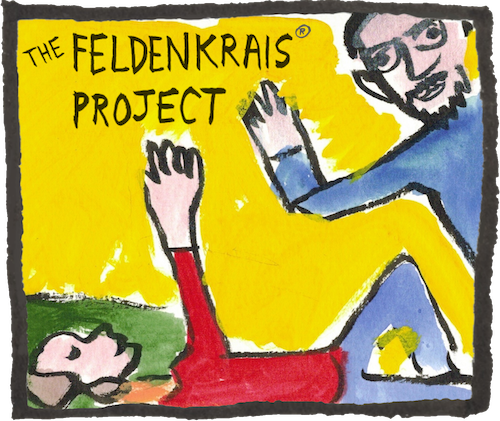Both lessons: whenever you’re resting on your back, if you want your knees bent and your feet standing, let your feet and knees be about the width of your hips.
Lesson 1: Please have a bath towel nearby to fold to an appropriate height for side-lying comfort. A smooth, level surface is useful so that your head is free to shift and roll.
Remember that Feldenkrais cardinal directions are relative to YOU: when you’re lying on your side, up is toward the top of your mat, down is toward the bottom. Forward is directly toward the wall in front of you and backward is toward the wall behind you.
In the first lesson’s side-lying positions, whenever you’re asked to have your arms and legs “square” or as if “in a simple chair,” the arms are extended out in front of you, elbows loosely straight, palm on top of palm, at the height of your shoulders. Your thighs are similar: knees directly in front of your hips, knees stacked together. Your hips and knees are bent 90 degrees, so that your lower legs are perpendicular to your thighs, and your feet are “below your knees” (directly down that mat from your knees).
In this position, whenever you “sweep your hand through the sky”, it’s the long, loosely straight, ceiling side arm we’re talking about.
The other side-lying configuration used frequently is with the arms and legs comfortably resting however you like. Elbows can be bent, the ceiling side arm can be balanced on your side or have its hand anywhere in front of you, knees can be loosely stacked wherever feels best.
On subsequent listenings of the first lesson, if it’s reasonably comfortable to lie on either side you might purposely choose to start on the other side (even if you have the same awareness of your preferred and non-preferred side). This will allow you to have a different experience of the lesson’s quite different explorations of your two sides.
If you tried the “personal test of limberness” suggested in the opening talk, you might try that again after either lesson.
This audio recording is found in Legacy and Alternate Lessons, which features other versions of some of our recordings, available exclusively to our Patrons.
All users can access this workshop’s separate, edited tracks in our Getting Oriented collection.
This recording was made in a workshop I called Move Smarter, Safer, and Stronger with Feldenkrais – Stretch without Strain: skill vs willpower and the strengths of rests.
Members and Patrons. Learn more or login:
Members and Patrons. Learn more or login:



